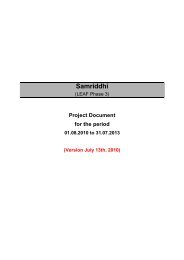Coorperation Strategy - Albania 2010-2013 - Deza - CH
Coorperation Strategy - Albania 2010-2013 - Deza - CH
Coorperation Strategy - Albania 2010-2013 - Deza - CH
You also want an ePaper? Increase the reach of your titles
YUMPU automatically turns print PDFs into web optimized ePapers that Google loves.
SWISS COOPERATION<br />
6<br />
Corruption remains a serious challenge. Democracy<br />
is still not deeply anchored throughout <strong>Albania</strong>.<br />
Political and administrative decentralisation<br />
continues and municipalities’ institutional capacity<br />
progresses positively, but slowly. The devolution of<br />
services and fiscal decentralisation remain unfinished,<br />
resulting in gaps in the delivery of services<br />
to citizens. The executive power is affected by a<br />
clientelism which prevents independent institutions,<br />
mainly the judiciary system, from functioning<br />
in full autonomy. Law enforcement remains weak<br />
and the lack of legal security remains problematic<br />
namely in the area of property rights, thus<br />
undermining economic activities and foreign investments.<br />
<strong>Albania</strong> has ratified all the human rights conventions<br />
including those related to gender equality,<br />
making women’s rights and empowerment formally<br />
part of its legislation. However, the general<br />
absence of political mechanisms to effectively enforce<br />
the existing laws has hampered the mainstreaming<br />
of gender equality. Media freedom has<br />
slightly improved over the last years, but still suffers<br />
from substantial political interference.<br />
1.2 Economic development<br />
<strong>Albania</strong> has enjoyed a period of sustained economic<br />
growth and economic reforms. From 2005<br />
to 2008, the economic system progressed towards<br />
a market economy. The country benefited<br />
from a steady annual GDP growth of around 6 %,<br />
enabling <strong>Albania</strong> to join the group of lower middle-income<br />
countries 1 in 2007. Overall, the economic<br />
development is characterised by macroeconomic<br />
stability and a low inflation of 2–3 %.<br />
Poverty significantly decreased from around 25 %<br />
in 2002, meaning 813,200 citizens living in poverty,<br />
to around 12 % (373,140) 2 . <strong>Albania</strong>’s grey<br />
economy estimated at around 30–50 % of GDP<br />
remains significantly large. The official unemployment<br />
rate is around 13 %, but is unevenly spread<br />
over the regions. The north-east of the country<br />
suffers most with an unemployment rate of 30–<br />
40 %. The per capita income was USD 3,290 in<br />
2008, a mere 22 % of the European Union (EU)<br />
average.<br />
While <strong>Albania</strong> is not sheltered from the global<br />
economic crisis, its impact is expected to be limited<br />
due to its modest share of exports with respect<br />
to the GDP 3 . The fact that <strong>Albania</strong> only very recently<br />
achieved middle-income country status<br />
points to its likely higher vulnerability to even relatively<br />
small changes in external factors, such as<br />
the tightening of credit standards which tend to<br />
cancel the drivers for economic growth. The increasing<br />
current-account deficit of the past years<br />
continues to be a challenge as the trade deficit<br />
widens, reaching 23 % in 2008, despite slightly<br />
growing exports and slowed down consumption<br />
in 2009. Remittances are an important source of<br />
income, but follow a declining trend 4 .<br />
<strong>Albania</strong> still is the country with the lowest foreign<br />
direct investment level in the Western Balkan region.<br />
Its economy is considered to be moderately<br />
free, while its competitiveness remains poor,<br />
mainly due to governance problems, widespread<br />
corruption and inadequate infrastructure. The<br />
country was among the top ten business performers<br />
in 2007–2008. However, the business environment<br />
at local and regional levels requires serious<br />
efforts and commitment to sustain private sector<br />
growth. Access to finance has substantially improved<br />
and the tax system, successfully reformed.<br />
Another important challenge for <strong>Albania</strong> is the<br />
long-term competitiveness of its private sector,<br />
1<br />
Following the International Development Association’s<br />
(World Bank) classification.<br />
2<br />
<strong>Albania</strong>: “Trends in Poverty” 2002–2005–2008, Living<br />
Standards Measurement Survey (LSMS) by INSTAT, WB<br />
and UNDP, draft short version April 2009 (final report<br />
not released).<br />
3<br />
However, <strong>Albania</strong>’s dependency on very few export<br />
markets, namely Italy, makes the country’s exports<br />
vulnerable.<br />
4<br />
This trend is expected to be accentuated with<br />
the economic crisis.

















